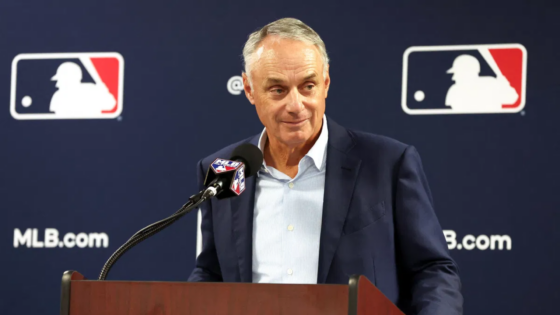When a 35-year relationship ends in public finger-pointing and financial shade, there’s bound to be fallout. Major League Baseball and ESPN didn’t just part ways; they aired all the dirty laundry on the way out. Now, with millions at stake and Sunday nights up for grabs, baseball’s primetime stage is looking more like a media speed date. The breakup was messy. The rebound? Potentially even more chaotic.
The relationship between ESPN and MLB was already a toxic one, and the rift between them might have been labeled “mutual,” but we all know the reality. But if you thought that the $550 million/year separation itself was messy, wait till you hear the three names in the race for Sunday Night Baseball.
In a recent interview, Rob Manfred revealed that there are 3 major names in the race for the broadcasting rights of Sunday baseball. As reported by Awful Announcing page, “MLB commissioner Rob Manfred revealed that NBC, Apple, and yes, ESPN, have all submitted bids for the league’s exclusive package of Sunday games.“
Major League Baseball is juggling its future as networks circle the prized Sunday Night Baseball package. ESPN opted out of its $550 million annual deal in February, ending a 35-year partnership in chaos. MLB Commissioner Rob Manfred recently confirmed “real progress” on a new short-term national rights deal. Talks include familiar names, ambitious newcomers, and the looming All-Star Game that once marked the original deadline.
May 2, 2025, Florida, USA: MLB, Baseball Herren, USA Commissioner Rob Manfred speaks with members of the media during the annual MLB Media Day at George M. Steinbrenner Field in Tampa on Thursday, Feb. 15, 2024. USA – ZUMAs70_ 0816017662st Copyright: xTampaxBayxTimesx
Manfred revealed the package could be split, hinting at a rare media timeshare arrangement. NBC could grab summer Sundays between its NBA and NFL programming void. Apple, seen as a front-runner, would push further into sports with tech-savvy presentation and reach. ESPN, once out, is now back in the room—because no breakup ever really sticks.
Any agreement struck will only run through 2028, when MLB reshuffles all national media rights. This short-term bandage lets the league test partners while evaluating streaming, local coverage, and broader reach. ESPN also wants local rights to five league-controlled teams, eyeing synergy with its DTC platform. With legacy pride, streaming money, and network egos at stake, this game’s just entering extra innings.
So what began as a breakup with receipts has turned into a media bidding war with remotes. MLB isn’t just reshuffling Sunday nights — it’s rewriting the broadcast playbook with split screens and short-term deals. In a sport built on tradition, even television contracts are now month-to-month flings. One thing’s clear: when ESPN and MLB say goodbye, they always leave the door half open. Stay tuned—because even reruns don’t get this dramatic.
Before fixing the broadcast, Major League Baseball needs to fix the ballgame.
Major League Baseball can juggle TV deals, woo tech giants, and reheat old partnerships all it wants — but no broadcast can save a broken product. Sunday nights might be up for grabs, but what fans see between innings matters more than who airs it. While Rob Manfred smooths out media wrinkles, the game on the field still limps through pace issues and identity crises. You can’t repackage chaos and call it primetime.
Baseball’s midsummer showcase still draws a crowd, but not like the old days. The 2025 MLB All-Star Game averaged 7.2 million viewers—respectable, yet still the joint-second lowest ever. The Home Run Derby surged with 5.73 million viewers, gaining ground on its once-mightier sibling. MLB may still win the night on Fox, but it’s losing the long game elsewhere.
While TV execs circle for rights, fans circle the real issue: the game’s fading relevance. Players, like Brent Rooker and Logan Webb, are calling for more “swing-offs” instead of sleepy extra innings. These mini-duels inject urgency and entertainment—two things traditional formats lack in today’s short-attention-span world. MLB should listen closely, because the clock isn’t just ticking—it’s already stolen seconds.
Bundling rights won’t fix a product that feels trapped in its slow-motion replay. Revamp the pace, spotlight fresh talent, and lean into drama, not nostalgia, to hook new viewers. The Derby’s growth and All-Star peaks show the appetite exists, just not for three-hour marathons. If MLB wants broadcast gold, it needs to swing smarter, not just harder.
Baseball doesn’t need another glossy trailer—it needs a director brave enough to rewrite the script. Viewers haven’t vanished; they’ve just tuned out the filler. If MLB can stage a swing-off for ratings, it can swing big on reform. Until then, no camera angle can hide a product that still jogs when it should sprint. Fix the game, and the viewers—and broadcasters—won’t just come back, they’ll stay.
The post 3 Potential Bidders Emerge Amid Grave Concerns Over Sunday Night Baseball’s Future After $500M ESPN Fallout appeared first on EssentiallySports.
